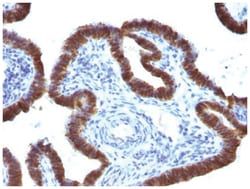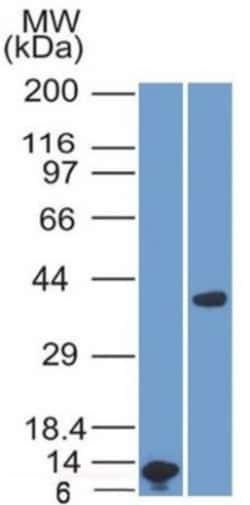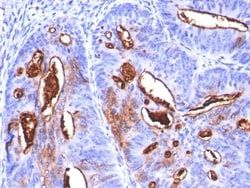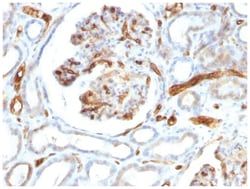ASRGL1 Antibody (CRASH/1289), Novus Biologicals™
Manufacturer: Fischer Scientific
The price for this product is unavailable. Please request a quote
Antigen
ASRGL1
Classification
Monoclonal
Conjugate
Unconjugated
Formulation
10mM PBS and 0.05% BSA with 0.05% Sodium Azide
Gene Symbols
ASRGL1
Immunogen
Recombinant human ASRGL1 fragment
Quantity
0.2 mg
Primary or Secondary
Primary
Test Specificity
ASRGL1 (Asparaginase-like protein 1), also known as CRASH, is a 308 amino acid protein belonging to the Ntn-hydrolase family. Asparaginases utilize asparagine as a substrate to produce aspartic acid and ammonia. ASRGL1 has been identified as a autoantigenic protein that is present in the mid-piece of sperm after obstruction of the male reproductive tract. ASRGL1 is expressed highly in testis, but is also expressed in brain, kidney and gastrointestinal tissues. High levels of ASRGL1 have also been identified in ovarian, uterine and mammary tumors in comparison with normal tissues of the same origin.
Content And Storage
Store at 4C.
Isotype
IgG
Applications
Western Blot, Flow Cytometry, Immunohistochemistry (Paraffin), SDS-Page, Immunofluorescence
Clone
CRASH/1289
Dilution
Western Blot 0.5-1ug/ml, Flow Cytometry 0.5-1ug/million cells, Immunohistochemistry-Paraffin 0.5-1.0ug/ml, SDS-Page, Immunofluorescence 0.5-1ug/ml
Gene Alias
ALP1, ALPL-asparagine amidohydrolase, asparaginase like 1, asparaginase-like 1 protein, Asparaginase-like protein 1, CRASH, EC 3.5.1.1, FLJ22316, L-asparaginase
Host Species
Mouse
Purification Method
Protein A or G purified
Regulatory Status
RUO
Gene ID (Entrez)
80150
Target Species
Human
Form
Purified
Description
- ASRGL1 Monoclonal specifically detects ASRGL1 in Human samples
- It is validated for Immunohistochemistry, Immunohistochemistry-Paraffin.




